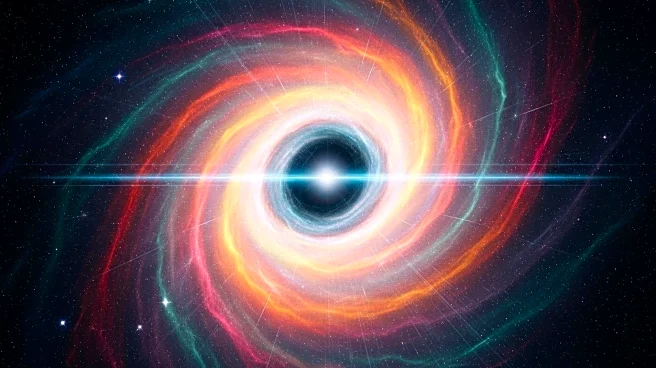What's Happening?
Astronomers have observed a surprising change in the polarization of the magnetic fields near the event horizon of the supermassive black hole at the center of the M87 galaxy, known as M87*. This discovery was made by the Event Horizon Telescope (EHT), an international collaboration using a global network of radio telescopes. The polarization flip occurred between 2017 and 2021, suggesting a complex internal magnetic structure near the black hole's event horizon. This finding challenges existing models and indicates that the magnetized plasma near the event horizon is dynamic and complex. The EHT's enhanced sensitivity, due to new telescopes added to its network, allowed scientists to detect subtle polarization signals, providing new insights into black hole physics.
Why It's Important?
The discovery of the polarization flip at M87* is significant as it provides new insights into the behavior of magnetic fields near black holes, which play a crucial role in how matter is absorbed and energy is emitted. This challenges current theoretical models and highlights the dynamic nature of the magnetized plasma near the event horizon. The findings underscore the importance of continued observation and study of black holes to deepen our understanding of these cosmic phenomena. The EHT's ability to deliver unprecedented images and data is a testament to its potential as a scientific observatory, advancing the field of astrophysics.
What's Next?
The EHT team plans to continue analyzing the new data collected from the enhanced network of telescopes. This ongoing research will likely lead to further discoveries about the behavior of magnetic fields and plasma near black holes. The scientific community anticipates that these findings will refine existing models and contribute to a more comprehensive understanding of black hole physics. As the EHT evolves, it is expected to provide even more detailed observations, potentially leading to breakthroughs in the study of cosmic phenomena.
Beyond the Headlines
The unexpected polarization flip at M87* raises questions about the fundamental nature of black holes and the forces at play near their event horizons. This discovery may prompt a reevaluation of existing theories and inspire new lines of inquiry in astrophysics. The dynamic behavior of the magnetized plasma could have implications for understanding the formation and evolution of galaxies, as well as the role of black holes in cosmic events. The EHT's findings may also influence future technological advancements in telescope design and data analysis techniques.









